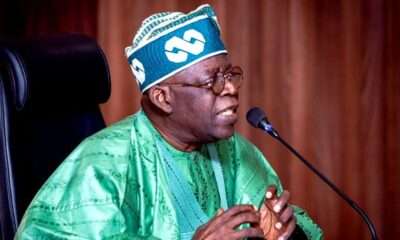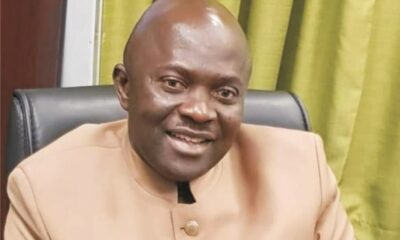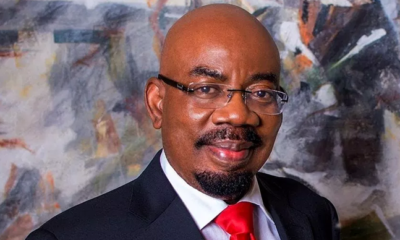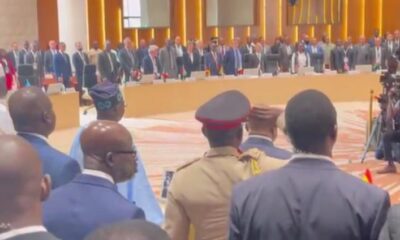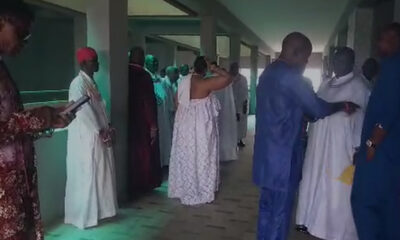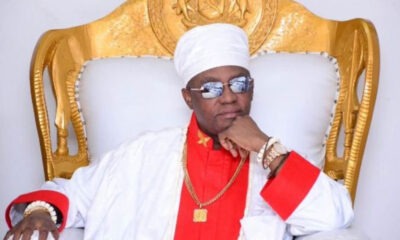News
Nigeria’s Forex Market Needs Restructuring—Tinubu’s Aide
Published
8 months agoon
By
Editor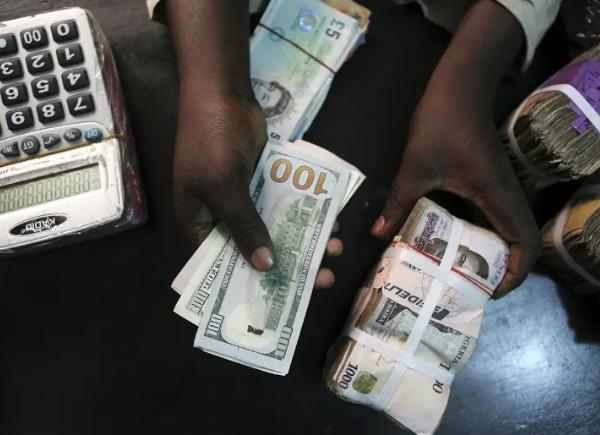
The Special Adviser to the President on Economic Affairs, Dr Tope Fasua, has called for a structural reform of Nigeria’s foreign exchange market.
Fasua made the call at a roundtable organised by the National Policy Advocacy Centre (NPAC) of the Abuja Chamber of Commerce and Industry (ACCI) on Tuesday in Abuja.
The theme of the event was “Unification of Foreign Exchange and the Effect of Fuel Subsidy Removal on the Business Community’’.
“I believe we should reform the Bureau De Change (BDC) sector and make it stronger. You cannot manage over 5,000 BDCs selling money on the streets.
“If we can do the structural reforms in the BDCs sector and the banks and supervise them well, the CBN with our reserves can incentivize that sector, allowing people to get money much quicker.
READ ALSO:
“And you have to define the illegal market and by then we will be able to find stability,” he said.
Fasua said that Nigeria spends over $45 billion annually importing refined petroleum products, milk, chemicals and fish, among others.
He said: “I hear things like scarcity of forex. What is scarcity of forex, as if the world owes us any forex.
“The world does not owe us any forex. The forex you get is depending on the trade that you do.
“If you look at Nigeria’s import and export profile, over 20 items that we import in Nigeria are in the billions of dollar range.
“Our biggest import, fuel and diesel take about $25 billion to $30 billion every year.
“We have things like cars, which is about four billion every year; sugar, fish, milk one billion each; wheat four billion; chemicals, three billion dollars; pharmaceuticals two billion dollars.”
Fasua listed crude oil and fertiliser as two things that Nigeria exports in the billion dollar range.
“The first is petroleum and gas, you will see a figure like $57 billion, but out of that only 30 per cent is ours, according to Nigeria Extractive Industries Transparency Initiative (NEITI).
“The international oil companies that have the technology that do production own most of that money,’’ he said.
The Director, Policy Advocacy Centre, ACCI, Mr Chidiebere Onwumere, said that foreign exchange unification held promises of increased transparency, improved access to forex and reduced market distortions.
He, however, said that it raises questions about exchange rate stability, inflationary pressures and the cost of imports.
“We must carefully consider how these factors will affect the competitiveness of our industries and the purchasing power of our citizens.
“Fuel subsidy removal, on the other hand, is expected to free up fiscal resources, reduce government spending, and potentially lead to increased investment in critical sectors.
“Yet, it also raises concerns about the immediate impact on transportation costs, inflation, and the welfare of our citizens, especially those in vulnerable communities,’’ he said.
Mr Oscar Onyema, Managing Director, Nigerian Exchange Group (NEG) PLC, said collaborative dialogue was essential in formulating policies that balance short-term challenges with long-term benefits.
Highlighting the effects of both policies on the economy, Onyema said that immediate transition could disrupt businesses and the economy in several ways.
Represented by Mrs Cordelia Ihedioha, Onyema said that businesses that were heavily reliant on imports may face short-term disruptions due to the sudden shift in exchange rates.
According to him, this could result in increased costs for imported raw materials, leading to potential price adjustments for end consumers.
“To mitigate these disruptions, businesses may need to explore alternative sourcing strategies and adjust their pricing models,” Onyema said
Mr Dele Alimi, Director General, Institute of Directors of Nigeria appealed to the Federal Government to take total control of the mineral sector.
He said: “The mineral sector over the years has been poorly handled by previous governments as host communities have been left impoverished by illegal mining activities.”
Alimi described the subsidy removal and unification of the foreign exchange as bold steps by the Federal Government, saying that it was a necessity for economic revival.
He urged more emphasis should be placed on efficiency of governance than cost of governance.
Dr Chijiokr Ekechukwu, Vice President of ACCI, urged the Federal Government to fix the refineries and dvocated alternative sources of energy for cars to cushion the effect of the petrol subsidy removal.
According to him, 60 per cent of cars in the United States run on electricity, adding, “that is where we should be headed for.”
He expressed concern that while the unification of foreign exchange rate brought checks and balances and better accountability, saying, “the high exchange has affected prices of goods and services.
“The inflation rate continues to coast upwards and there is a high cost of production, criminality, low standard of living and unemployment has risen above 33 per cent to 35 per cent.’’
Mr Asishana Okauru, the Director General of the Nigerian Governors’ Forum, represented by Olarenwaju Ajibasile said the cost of governance needed to be channelled to the local sector.
“Pattronising locally made products will bost the local economy,’’ he said.
Olasupo Agbaje, General Manager Economic Regulations, Nigeria Midstream and Downstream Petroleum Regulatory Authority (NMDPRA) said that efficiency in the downstream operations was key in sustaining the petrol subsidy removal.
“What we hope for and where we want to be is not just the Nigeria National Petroleum Company Limited (NNPCL) being the sole supplier.
“We want other operators, the private sector coming in and this is one of the objectives of the Petroleum Industry Act,” Agbaje said.
You may like


Why Tinubu Didn’t Intervene In Ganduje’s Troubles – APC Leaders


Tinubu Bows To Pressure, Orders CBN To Suspend Implementation Of Cybersecurity Levy


Tinubu Appoints Wike’s Ex-chief Of Staff MD Ogun-Osun River Basin Authority


Tinubu Appoints Jim Ovia As Student Loan Fund Chairman


Tinubu Sacks NESREA, NDRBDA MDs, Appoints New Heads


Tinubu Unveils African Counter-Terrorism Summit
News
JUST IN: Confusion As DSS Invades Ogun Court, Arrests Defendants Despite Judge’s Warning
Published
22 mins agoon
May 14, 2024By
Editor
The men of the Department of State Services have invaded an Ogun State High Court sitting in Ilaro and arrested two defendants despite the judge’s warning.
The court was presided over by Justice AA Shobayo on Tuesday.
The defendants, who were simply identified as Alhaji Isiaka Fatai and Samuel Oyero, were tried in a suit marked HCP/IC/2023 between the State vs Awode Oladosu & 13 others.
The case was reported to be a result of a crisis that recently broke out in the Agosasa community in the Ipokia Local Government Area of the state over an Obaship tussle which led to the destruction of property worth billions of naira and loss of life.
Meanwhile, when the hearing was ongoing, operatives of the DSS stormed the court premises and took away the suspects.
Confirming the incident to Daily Trust, Counsel to Alhaji Isiaka, Kehinde Bamiwola, in a statement, alleged that men of the DSS operatives used weapons on the two, stressing that “Alhaji Isiaka Fatai was beaten, slapped, man-handled, rough-handled and molested.”
Corroborating Bamiwola’s claim, the Principal Registrar of the High Court and Sectional Head of High Court, Ilaro, Omololu Olusanya, confirmed the incident, describing it as shocking and disrespectful to the rule of law.
He stressed that even after the judge had ordered the operatives not to make any arrest within the court premises, they still proceeded to arrest the two persons.
“They still went ahead and did the act to the extent that they assaulted one of our staff members, Mrs Fadina, while doing that act. It’s a very sad issue that caused a lot of noise within the court premises.
“It was from the source that we heard they were DSS agents. If anybody sees them, one would think they were armed robbers.
Olusanya further said that their appearance was far from being identified as DSS agents, adding, “They did not wear anything that identified them as DSS, but they came to my lord this morning and said they had some people to arrest. That was when we knew they were DSS officers.
“They approached the judge before the court session began. The honourable judge advised them that if they wanted to make an arrest, it must not be done within the court premises.
“They could stay outside and do whatever they wanted, but they refused that advice and carried out the arrest within the premises,” he said.
However, when contacted, the spokesman for the DSS, Peter Afunanya, did not answer calls or reply to text messages sent as of the time of filing this report.

A yet-to-be-identified man has been apprehended for possessing a bomb on the premises of a bank in Dadin Kowa town in the Jos South area of Plateau State.
It was gathered that immediately it was discovered that a bomb was in the suspect’s possession, an alarm was raised, and he was quickly pinned down to avert a tragedy.
According to a post by security analyst Zagazola Makama on X on Tuesday, the vigilante security at the bank prevented the attack when they spotted the suspect.
Upset by the development, an angry mob descended on the suspect and reportedly demanded that he should be killed.
READ ALSO: Truck Crushes Five-year-old Girl In Lagos
The suspect was later handed over to the police for proper investigation.
A picture attached to Makama’s post showed that the bomb was strapped around the suspect’s belly.
It is, however, unclear if the suspect had been linked to any terrorist organisation in the country.
Details later…
News
BREAKING: Niger Speaker Halts Wedding Plans For 100 Orphans
Published
1 hour agoon
May 14, 2024By
Editor
The Speaker of the Niger State House of Assembly, Abdulamlik Sarkindaji, has stopped the planned hosting of the wedding of 100 orphan girls in his constituency, saying he would not grace the occasion.
Sarkindaji took the decision following the action of the Women Affairs Minister, Uju Ohannaya, who dragged the Speaker to court to halt the wedding.
The Speaker made this known on Tuesday during a media briefing in which he said the minister had overstepped her bounds.
He said the minister should take over the sponsorship of the wedding ceremony.
READ ALSO: Banditry: Niger Speaker To Marry Off 100 Female Orphans
The Speaker disclosed that he had already made funds available to the girls’ parents through the traditional leaders and clerics of his constituency, noting that he would not withdraw the funds.
Abdulmalik also pointed out that his motive for wanting to sponsor the wedding was the state of poverty of the girls’ parents and not the constituency project, as reported in the media.
Details later…

JUST IN: Confusion As DSS Invades Ogun Court, Arrests Defendants Despite Judge’s Warning

Man Arrested For Invading Plateau Bank With Bomb

BREAKING: Niger Speaker Halts Wedding Plans For 100 Orphans
Trending

 Politics3 days ago
Politics3 days agoRivers Crisis: Why Gov Fubura Got Into ‘Trouble’ – Secondus

 News5 days ago
News5 days agoVIDEO: Nigerian Man Exhumed After Completing 24-hour Buried Alive Challenge

 Metro3 days ago
Metro3 days agoKogi University Lecturer Stripped Over Alleged Sexual Harassment

 News4 days ago
News4 days agoNigerian Army Pulls Out 29 Retired Generals

 News3 days ago
News3 days agoEFCC Stops Dollar Transactions, Asks Embassies To Charge In Naira

 News5 days ago
News5 days agoOver 100 Priests, Palace Chiefs Storm Court For Oba Of Benin In Solidarity

 News3 days ago
News3 days agoWhy We Took Over Rivers Assembly Quarters – Police

 News5 days ago
News5 days agoSuspension Of Enigies: Court Grants Benin Monarch’s Prayer To Join BTC

 News2 days ago
News2 days agoTobi Amusan Becomes World’s Fastest Woman With New Track Record

 News1 day ago
News1 day agoBREAKING: Organised Labour Shut BEDC Head Office


